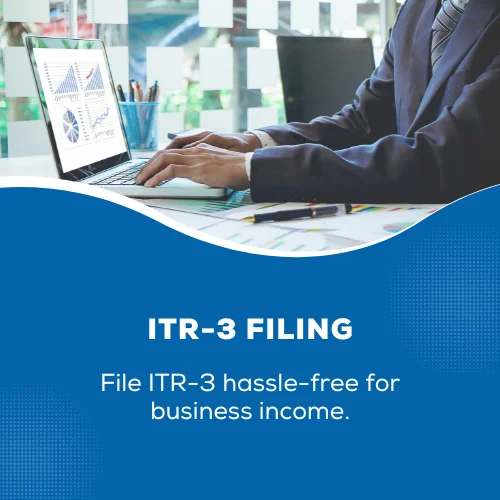ITR-3 Filing
ITR-3 Filing Made Easy for Business Owners & Professionals!
Expert-verified filing with 100% compliance, secure processing, and maximum benefits for your business or profession.

File Your ITR-3 in Minutes – File Now!
- Get Instant Quote
What’s Included ✅
- Consultation on Eligibility for ITR-3
- Preparation & Filing of ITR-3 Form
- Computation of Business/Professional Income
- Balance Sheet & P&L Preparation (if required)
- Claiming Business Expenses & Deductions
- Capital Gains, Salary & Other Income Reporting
- Filing Acknowledgment (ITR-V) & E-Verification Support

Exclusive Free Benefits 🎁
- Check if ITR-3 is right for you – clear guidance.
- Tips on claiming business expenses – save more tax.
- Refund tracking help – we’ll monitor it for you.
- Easy docs checklist (PDF) – know exactly what to arrange.
- One free consultation on tax planning – prepare smartly for next year.
- Consultation with CA/CS/Advocate Free for Lifetime
10,000+ Companies & Individuals Put Their Trust In Us
























✅ Clear Guidance: They explained every step in simple, easy-to-understand terms, so I always knew what was happening.
✅ Fast & Efficient: My filing was completed quickly without any unnecessary delays.
✅ Accuracy & Trust: I felt confident knowing my details were handled with care and precision.
✅ Great Support: Any small questions I had were answered patiently and thoroughly.
Income Tax Return Filing With ITR 3
It is an essential process for individuals as well as businesses to file Income Tax Return Filing With ITR 3 in India. Income Tax Return is a crucial document that has been submitted by taxpayers to the Income Tax Department in order to report their income, expenses, deductions, as well as tax liabilities for a financial year. There are different ITR forms that have been prescribed for different categories of taxpayers. Among the various forms that have been designed by the Income tax department, ITR 3 specifically serves some specific categories of taxpayers including Individuals and HUFs i.e. Hindu Undivided Family who have income from business or profession. You should choose the correct ITR form wisely in order to comply with tax regulations and safeguard your financial interests.
Understand everything about ITR 3 properly with the help of top online income tax return filing portals like Click To Professionals.

What is ITR 3 Form?
Benefits of Filing ITR 3
Compliance With Tax Laws
Income Tax Return Filing will make sure that you meet legal obligations as well as to avoid penalties.
Carry Forward Losses
With the help of Income Tax Return Filing (ITR 3) you can carry forward losses in order to set off in subsequent years.
Easy Approval of Loan and Visa Applications
You can submit the receipts of ITR 3 as the proof of income for the facilitation of loan approvals and visa applications.
Claim Income Tax Refunds
If you file an Income Tax Return, you can claim refunds for excessive TDS or advance tax paid.
Avoidance of Notices
If you file Income Tax Return properly, you can minimize the chances of income tax notices.
Transparency
If you file the returns properly in detail, it will make sure about financial transparency and compliance.
Compliance With Tax Laws
Carry Forward Losses
Easy Approval of Loan and Visa Applications
Claim Income Tax Refunds
Avoidance of Notices
Transparency
Who is Eligible to File ITR 3?
We will provide you with a general understanding of who is typically eligible to file ITR 3 form in India. The ITR 3 form in India is primarily meant for the income from business or profession. Here are the key eligibility criteria for filing ITR 3. It can be filed by the Individuals and HUFs who meet some of the specific criteria which are as given below:
- Income from Salary or Pension
- Income from house property (rental income from property owned)
- Income from capital gains including profits from the sale of property, shares, or other assets
- Income from other sources like interest, dividends, or lottery winnings
- Income from foreign assets, or investments (if applicable)

Who is not eligible to File Income Tax Return with ITR 3?
ITR 3 is not applicable to all individuals or HUFs i.e. Hindu Undivided Families. The given individuals are not allow to file ITR 3, instead they need to choose some other forms:
Salaried Individuals
Individuals having income only from salary, house property, or capital gains and no business income are not eligible to file ITR 3 instead they have to file ITR 1 or ITR 2.
Business with Presumptive Taxation
Businesses that have opted for presumptive taxation as per section 44AD, 44ADA, 44AE are not eligible to file ITR 3 instead they need to file ITR 4.
Companies and LLPs
Firms or companies as well as LLPs i.e. Limited Liability Partnerships have separate tax returns forms.
Income Tax Return Due Date
- The Income Tax Return last date for filing ITR 3 is typically the same as for other forms, providing protection from penalties for late filing.
- Usually the last date of filing ITR 3 will be 31st July until there are any changes made by the government.
- In audit cases, the due date to file Income Tax Return will be October 31st.
Structure of Form ITR 3
- Part A: General Information
- Part B: Gross Total Income
- Part C: Deductions and Total Taxable Income
- In this section you have to mention about the numerous deductions applicable to you including deductions under section 80D, 80C, 80G, etc.
- You also have to mention the total taxable income after deductions.

- Part D: Tax Computation and Tax Status
- Schedules in ITR 3
- Schedule BP: Details of income from business or profession
- Schedule CG: Details of capital gains
- Schedule OS: Income from other sources
- Schedule AL: Statement of assets and liabilities for individuals with total income exceeding ₹50 lakh
- Schedule AMT & AMTC: Alternate Minimum Tax calculation (if applicable)
Income Tax Return Filing With ITR 3 Process
The process of Income Tax Return includes a number of tricky steps. You should have to understand its process properly for which you can seek the professional guidance of expert ITR filing consultants. The major steps are as given below:
Firstly, you have to visit the official website of e- filing of income tax return which is https://www.incometax.gov.in/iec/foportal/
- After login, if you are a first time user you have to register yourself.
- If you are the repeat user you have to log in to the website.
- You have to enter your PAN as your user id and then click ‘Continue’.
- You have to check the security message given in the tick box.
- Then, you have to enter your password & click on the ‘Continue’ button.
After logging in, you will see the e- file menu on the menu bar. When you click on the e – file menu then, you will get the option of ‘Income Tax Returns’ on clicking which you will see the option of ‘File Income Tax Return’ and you have to click on that option.
You will be redirected to the page of Income Tax return where you have to select the ‘assessment year’ and the ‘mode of filing’ for which you wish to file the income tax return and then you have to click on ‘Continue’.
After that, you have to select the status of filing ITR as Individual and click on ‘Continue’.
- Personal information: Your basic details including your full name, PAN, Aadhaar Number, contact details, bank account details.
- Gross total income: You have to enter & verify your total income from all the sources along with the details of exempt income.
- Total deductions: The information about the deductions that you need to be claimed under the different sections.
- Tax paid: Reflects the tax paid by you from all the sources but not been limited to TDS, TCS, Advance Tax & Self – assessment
- Total tax liability: This section reflects the total tax liability as per the information provided by you previously. If the amount is negative then it can be claimed as the refund and if the amount is positive then you have to pay the following amount as tax.
You have to choose the reason for filing the ITR. You have to select the correct option that has been applicable to your situation:
- Taxable income is more than the basic exemption limit
- Meets specific criteria & compulsory requirement of filing the ITR
- Others
You need to add your bank details. If already submitted, then you have to make sure that it has been pre- validated. You have to review the correctness of pre- filled information that has appeared on the new page.
Your screen will display the summary of the tax computation according to your given information and you will get to know if you have to pay any tax or you are eligible for a tax refund. Then, you have to enter the place of your residence to preview and submit your ITR.
E- Verification of ITR is the most crucial step. Your Income Tax Return will be incomplete until you verify it. You have the option to e – verify the ITR via Aadhaar OTP, Net banking EVC i.e. Electronic Verification Code or by sending a physical copy of ITR to CPC Bengaluru.
At last, you have to click on the ‘Submit’ button to submit your ITR. After submission you will get the acknowledgment from the Income Tax department at your given email id.
Find a local agent for your legal & registration service
+91 8448094507
Phone No.
info@clicktoprofessionals.com
Get Support
Key Points to Remember While Filing ITR 3
You should take care of some of the key considerations while filing income tax return with the help of ITR 3 which are as given below:
You should have to double-check all the details before submission in order to avoid errors and penalties.
Essential Documents Required to File ITR 3
- PAN Card of the Taxpayer
- Aadhaar Card
- Bank Account Details
- Form 16 (If applicable)
- Form 26AS (Tax Credit Statement)
- Profit and Loss Account
- Balance Sheet
- GST Details (if applicable)
- Investment proof for deductions including PPF, LIC, ELSS, etc.
- Trading Account for Traders
- Details of Capital Gains & Foreign Assets (if applicable)

Common Mistakes to Avoid While Filing ITR 3
Although the process of filing ITR 3 is very simple, still you have to take care of some mistakes that you should avoid while filing this form. Such common mistakes are as given below:
Filing the Wrong Form
You have to make sure that you should meet the eligibility criteria for ITR 3 before proceeding.
Mismatch in Income Details
It will be better to cross-verify the details in Form 16 and Form 26AS and bank statements with the information entered in ITR.
Incorrect Personal Details
You have to declare all your personal details including PAN, Aadhaar, and Bank account details.
Skipping Deductions and Tax Credits
You have to declare all eligible deductions to minimize the tax liability and must verify form 26AS in order to make sure about all TDS Credits are claimed.
Missing the Deadline
Just make sure that you don’t miss the deadline as late filing attracts penalties as per section 234F.
Penalties for Non-Filing of ITR 3
If you fail to file your ITR on time or provide incorrect information can lead to the hefty penalties which are as given below:

Late Filing Penalty u/s 234F
- If you file the ITR after the deadline but before 31st December, a penalty of Rs. 5,000/- may be levied on the taxpayer.
- If you file your ITR after 31st December, the penalty will be of Rs. 10,000/-
- For taxpayers having an income of below Rs. 5 lakhs, the maximum penalty will be Rs. 1,000/-
Interest on Outstanding Tax
- An interest of 1% per month may be charged on unpaid tax liabilities as per the section 234A, 234B, & 234C for delay in payments.
Prosecution
- In severe cases, if you fail to file Income Tax returns may lead to prosecution under the Income Tax Act.
Final Words
ITR 3 is a comprehensive tax return form that has been used by individuals as well as HUFs i.e. Hindu Undivided Families who earn income from business or profession. If you file the form accurately you can make sure about compliance with tax laws along with maximizing deductions and minimizing penalties. It requires accurate reporting of income, deductions, and compliance with tax laws to file the form properly. You can avoid errors and hefty penalties by understanding the eligibility structure and filing process of ITR 3. If you understand properly and file ITR 3 timely, it will reflect responsible citizenship as well as contribute to the growth of the nation.
In order to navigate the complications or doubts you can seek the professional guidance of expert Income Tax Return consultants like Click To Professional.











